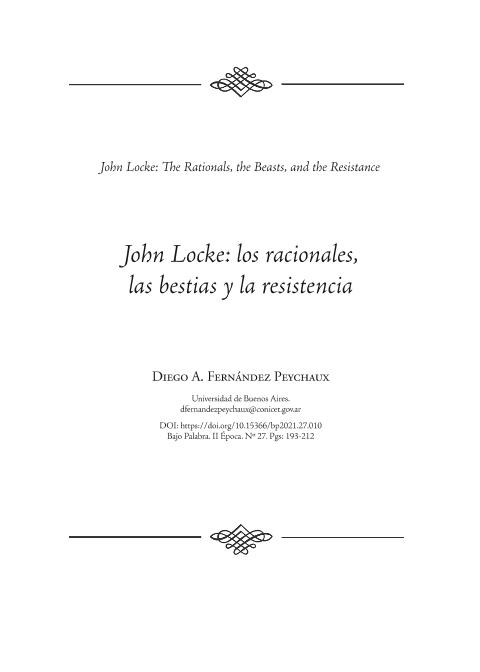Mostrar el registro sencillo del ítem
dc.contributor.author
Fernández Peychaux, Diego Alejandro

dc.date.available
2022-08-16T12:27:01Z
dc.date.issued
2021-06
dc.identifier.citation
Fernández Peychaux, Diego Alejandro; John Locke: los racionales, las bestias y la resistencia; Universidad Autónoma de Madrid; Bajo Palabra; 27; 6-2021; 193-212
dc.identifier.issn
1576-3935
dc.identifier.uri
http://hdl.handle.net/11336/165558
dc.description.abstract
En los Dos tratados sobre el gobierno civil, Locke distingue a las asociaciones de las sociedades políticas. Solo en las sociedades políticas existen una ley común, una judicatura a la que apelar con autoridad para decidir entre las controversias y un poder colectivo suficiente para castigar a los infractores. Al hacer esta distinción, Locke pareciera afirmar que la sociedad política subsiste mientras cesen los conflictos naturales, pero también, y no menos importante, que no hay verdaderos vínculos políticos hasta que tales disputas no cesan. Dicho de otro modo, el ámbito político lockeano aparece vaciado de conflictividad. Locke recurre en dicho “vaciamiento” a diversas figuras (el ladrón, el animal, el testarudo, el descontento alborotador, el tirano) para despolitizar los conflictos remanentes o ulteriores sobre las normas comunes. En todas ellas subyace la identificación de lo racional con lo político y con lo humano. En el artículo se propone un análisis de los límites de tales exclusiones, pero de forma interna a la teoría lockeana.
dc.description.abstract
In the Two Treatises on Civil Government, Locke distinguishes associations from political societies. Only in political societies exist a common law, a judiciary to appeal to with authority to decide between disputes, and enough collective power to punish offenders. In making this distinction, Locke seems to assert that political society subsists as long as natural conflicts cease, but also, and not least, that there are no true political ties until such disputes cease. In other words, the Lockean political field appears emptied of conflict. In this “emptying”, Locke resorts to various figures (the thief, the animal, the raving mad-man, the heady malcontent, the tyrant) to depoliticize the remaining or subsequent conflicts about common norms. In all of them lies the identification of the rational with the political and with the human. The article proposes an analysis of the limits of such exclusions, but internal to Lockean theory.
dc.format
application/pdf
dc.language.iso
spa
dc.publisher
Universidad Autónoma de Madrid

dc.rights
info:eu-repo/semantics/openAccess
dc.rights.uri
https://creativecommons.org/licenses/by/2.5/ar/
dc.subject
CONFLICTO POLÍTICO
dc.subject
FUNDAMENTOS DE LO POLÍTICO
dc.subject
FIGURAS RETÓRICAS
dc.subject
CONTRACTUALISMO
dc.subject.classification
Otras Ciencia Política

dc.subject.classification
Ciencia Política

dc.subject.classification
CIENCIAS SOCIALES

dc.title
John Locke: los racionales, las bestias y la resistencia
dc.title
John Locke: The Rationals, the Beasts, and the Resistance
dc.type
info:eu-repo/semantics/article
dc.type
info:ar-repo/semantics/artículo
dc.type
info:eu-repo/semantics/publishedVersion
dc.date.updated
2022-08-16T00:46:34Z
dc.identifier.eissn
1887-505X
dc.journal.number
27
dc.journal.pagination
193-212
dc.journal.pais
España

dc.journal.ciudad
Madrid
dc.description.fil
Fil: Fernández Peychaux, Diego Alejandro. Universidad de Buenos Aires. Facultad de Ciencias Sociales. Instituto de Investigaciones "Gino Germani". Area Teoría Política; Argentina. Consejo Nacional de Investigaciones Científicas y Técnicas; Argentina
dc.journal.title
Bajo Palabra
dc.relation.alternativeid
info:eu-repo/semantics/altIdentifier/url/https://revistas.uam.es/bajopalabra/article/view/bp2021_27_010
dc.relation.alternativeid
info:eu-repo/semantics/altIdentifier/doi/http://dx.doi.org/10.15366/bp2021.27.010
Archivos asociados
